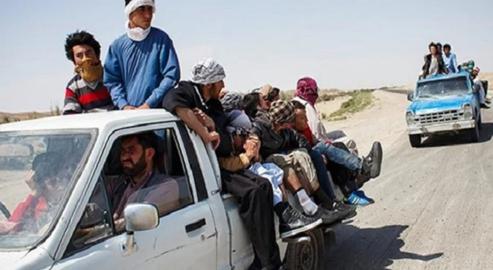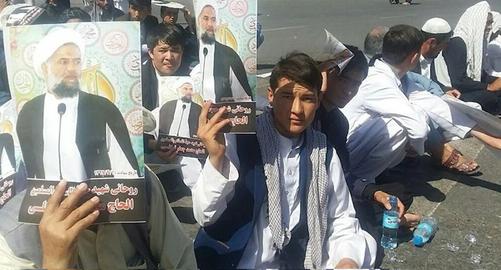"To get to Tehran, we had to cross three police checkpoints. Passing through these checkpoints was the most difficult stage of the journey; the police are armed to the teeth and we had to run away from them in the darkness.
“There were 300 of us when we came to the first checkpoint. We were like a flock of sheep, guided by just two shepherds, one behind and one up at the front. A woman screamed into the night air: she had lost her two-year-old child. The smugglers put us into cars, but the woman kept dashing around, calling for her baby. The car pulled away and we never found out what happened to them.”
Mehdi Heydari was fourteen years old when he fled Afghanistan in 2015, fearing for his life. But it was what happened to him next that would destroy his sense of security for good, along with his boyhood dreams.
Mehdi grew up in Oruzgan, a mostly-tribal province in central Afghanistan that has been ravaged by a heavy Taliban presence over many years, and where terror group has been repeatedly accused of killing civilians. In the fall of 2015 the Taliban launched a large-scale attack on Oruzgan and Mehdi’s family was one of at least 70 that tried to escape, heading for the Iran-Pakistan border.
They spent three months in the mountainous Afghan region of Jaghori, where poverty and a lack of jobs made it impossible for them to earn a crust, before Mehdi decided to strike out for Iran to make some money for his family. Five years later, he is still haunted by the journey that followed.
Eleven of Mehdi’s neighbors accompanied him on the trip. Like thousands of other Afghans before them they went to the border province of Nimrouz, and there engaged with smugglers who promised them an easy crossing into Iran. They began as a group of 28.
They had reached the Pakistani border by car when the Taliban stopped them. Crossing the border is only possible only by paying a sum of money known as Salahi to the Taliban. Their convoy duly paid up and entered Pakistan, where a group of local people-traffickers held them in situ for two days until it was deemed safe to enter Iran.
But on the border, Mehdi was confronted by a flood of his compatriots. "There were 300 of us all in all,” he said, “and we had to cross the Moshkel mountain. We walked for a whole day. It was hard; we had no water or bread, and one person fainted from thirst and another from hunger and fatigue.
“Finally we reached the bottom of the valley, and that meant we had entered Iran. There several Iranian smugglers were waiting for us in Toyota cars, each loading up with passengers who had been grouped together in the town of Nimrouz. We were the same 28-people group as we had been in Nimrouz, in one Toyota car."
The convoy’s destination was Tehran. In order to reach it they had to pass through three police checkpoints, getting out of the car and crossing on foot. Although Mehdi himself was still only a child, he hugged younger children along the way: "It was horrible. We passed checkpoints at Kerman, Yazd, and Isfahan. Passengers from a two-year-old child to 70-year-old men and women were all walking together."
It was at the first checkpoint that Mehdi remembers the mother searching frantically for her child and becoming separated from the group. His last memory of this part of the journey is of the car pulling away, and her screams echoing under the night sky.
The smugglers constantly transferred passengers from one car to another on their way to Tehran: a nightmare in itself. During those five days, Mehdi was placed at times in the trunk of a car, and told to hang onto the underside of a bus. “In Nimrouz they had promised they would take us on safe and easy routes, and that water and bread would always be available. We were told we would have 13 people in big Toyota cars and five people in smaller cars. Everything he said was a lie."
On arrival in Tehran, Mehdi’s group was handed over to local traffickers who had accommodation waiting for them. When Mehdi entered the dormitory, he saw a number of his compatriots had been living there for some time. They had been taken hostage to extort more money from their families. These people explained they had been abducted by a group of smugglers near Isfahan, who were demanding 30 million tomans [$1,200] each for their release. Had they known, they would probably never have left Afghanistan.
Three days after Mehdi began his journey, his friend and neighbor, Yahya, had followed suit. But he, too, was abducted near Isfahan and held to ransom by smugglers. Yahya’s family had no more money to give, and so the boy was killed.
Today, Mehdi is working in Tehran and trying to scrape a living for his family back home. But any success he has here will be tinged with the bitterness and unfairness of what he witnessed: of the death of Yahya, of his family’s untold pain in Afghanistan, and of the tears of a mother lost in the borderlands.
Related coverage:
A Teenager’s Story of Being Trafficked into Iran
Afghan Migrants are Systematically Brutalized by Iran's Border Police
visit the accountability section
In this section of Iran Wire, you can contact the officials and launch your campaign for various problems


























comments